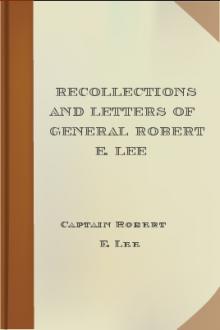Recollections and Letters of General Robert E. Lee by Captain Robert E. Lee (howl and other poems .txt) 📕

- Author: Captain Robert E. Lee
- Performer: -
Book online «Recollections and Letters of General Robert E. Lee by Captain Robert E. Lee (howl and other poems .txt) 📕». Author Captain Robert E. Lee
“General Lee’s physicians attributed his death in great measure to moral causes. The strain of his campaigns, the bitterness of defeat aggravated by the bad faith an insolence of the victor, sympathy with the subsequent sufferings of the Southern people, and the effort at calmness under these accumulated sorrows, seemed the sufficient and real causes that slowly but steadily undermined his health and led to his death. yet to those who saw his composure under the greater and lesser trials of life, ad his justice and forbearance with the most unjust and uncharitable, it seemed scarcely credible that his serene soul was shaken by the evil that raged around him.
“General Lee’s closing hours were consonant with his noble and disciplined life. Never was more beautifully displayed how a long and severe education of mind and character enables the soul to pass with equal step through this supreme ordeal; never did the habits and qualities of a lifetime, solemnly gathered into a few last sad hours, more grandly maintain themselves amid the gloom and shadow of approaching death. The reticence, the self-contained composure, the obedience to proper authority, the magnanimity, and the Christian meekness, that marked all his actions, still preserved their sway, in spite of the inroads of disease and the creeping lethargy that weighted down his faculties.
“As the old hero lay in the darkened room, or with the lamp and hearth-fire casting shadows upon his calm, noble front, all the missing grandeur of his form, and face and brow remained; and death seemed to lose its terrors and to borrow a grace and dignity in sublime keeping with the life that was ebbing away. The great mind sank to its last repose, almost with the equal poise of health. The few broken utterances that evinced at times a wandering intellect were spoken under the influence of the remedies administered; but as long as consciousness lasted there was evidence that all the high, controlling influences of his whole life still ruled; and even when stupor was laying its cold hand on the intellectual perceptions, the moral nature, with its complete orb of duties and affections, still asserted itself. A southern poet has celebrated in song these last significant words, ‘Strike the tent’: and a thousand voices were raised to give meaning to the uncertain sound, when the dying man said, with emphasis, ‘Tell Hill he must come up!’ These sentences serve to show most touchingly through what fields the imagination was passing; but generally his words, though few, were coherent; but for the most part, indeed, his silence was unbroken.
“This self-contained reticence had an awful grandeur, in solemn accord with a life that needed no defense. Deeds which required no justification must speak for him. His voiceless lips, like the shut gates of some majestic temple, were closed, not for concealment, but because that within was holy. Could the eye of the mourning watcher have pierced the gloom that gathered about the recesses of that great soul it would have perceived a presence there full of an ineffable glory. Leaning trustfully upon the all-sustaining Arm, the man whose stature, measured by mortal standards, seemed so great, passed from this world of shadows to the realities of the hereafter.”
A letter from my mother to a dear friend tells the same sad story: “…My husband came in. We had been waiting tea for him, and I remarked: ‘You have kept us waiting a long time. Where have you been?’ He did not reply, but stood up as if to say grace. Yet no word proceeded from his lips, and he sat down in his chair perfectly upright and with a sublime air of resignation on his countenance, and did not attempt to a reply to our inquiries. That look was never forgotten, and I have no doubt he felt that his hour had come; for though he submitted to the doctors, who were immediately summoned, and who had not even reached their homes from the same vestry-meeting, yet his whole demeanour during his illness showed one who had taken leave of earth. He never smiled, and rarely attempted to speak, except in dreams, and then he wandered to those dreadful battlefields.
Once, when Agnes urged him to take some medicine, which he always did with reluctance, he looked at her and said, ‘It is no use.’
But afterward he took it. When he became so much better the doctor said, ‘You must soon get out and ride your favorite gray!’ He shook his head most emphatically and looked upward. He slept a great deal, but knew us all, greeted us with a kindly pressure of the hand, and loved to have us around him. For the last forty-eight hours he seemed quite insensible of our presence. He breathed more heavily, and at last sank to rest with one deep-drawn sigh. And oh, what a glorious rest was in store for him!”





Comments (0)